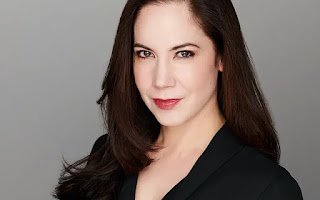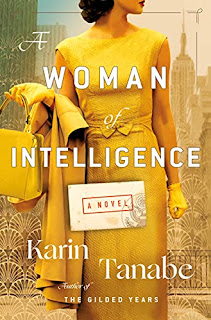Karin Tanabe is the author of the new novel A Woman of Intelligence. Her other novels include A Hundred Suns, and her work has appeared in a variety of publications, including The Washington Post and Politico. She lives in Washington, D.C.
Q: What inspired you to write A Woman of Intelligence, and how did you create your character Katharina?
A: Two things came together to create the idea for the book and Katharina.
I was personally dealing with postpartum depression, which manifested as a loss of identity coupled with an unhealthy dose of anger, and I had to come up with a book idea.
A few of my ideas had to do with making a mom a hit woman for hire! My editor talked me off that ledge and we decided that the main character could instead be a mother who also works as a spy.
I read about Elizabeth Bentley, who was an American spy for the Soviets during WWII. I put the ideas together and Katharina and the book started to take shape.
Q: How did you research the book, and did you learn anything that particularly fascinated you?
A: A lot of my research was about what it was like to be a mother in New York City in the 1950s, gender and racial discrimination, and of course quite a bit about the Cold War. My last book was set in Paris and in Vietnam, so just doing my research in English this time around seemed like a vacation!
What was the most fascinating to me was reading women’s magazines from the 1950s and seeing the advertisements that targeted women. Of course I knew the era was sexist, but it was hard to see how painfully sexist it was up close.
Q: Carol Memmott, in her Washington Post review, writes, “This is a mid-20th-century period piece, but oh, how familiar it all seems: Women are judged for not having children, for delaying motherhood or for having children and not staying home. Most radically of all, Tanabe writes spot-on about something many men and women are still loath to talk about: that women can love their children but still crave and need a life outside the home.” What do you think of that description, and how would you compare Rina's situation to that of many women today?
A: I think it rings 100 percent true. And I think it goes further than that. Women can still love their children and say, I really hate being a mother today. But we don’t. There’s so much pressure to pretend we love every minute when let’s be honest, so much of it is very hard and can be pretty soul-sucking.
For me, I’d like to hear more about women being women first and mothers second, as it always seems to be the other way around.
Q: What do you hope readers take away from the story?
A: I hope that all readers, whether they are parents or not, see A Woman of Intelligence as a story about reinvention. The way we can look in a mirror, decide we don’t like what we see—and I mean more mentally than physically—and decide to become something else.
I think a lot of people have been soul-searching during the pandemic and I hope Rina can be inspirational. She very much says, This life is not for me, how can I change it and become a new, maybe better, version of myself?
Q: What are you working on now?
A: I’m working on a book set in 1977 in Los Angeles and I’m absolutely loving the era. Look out for it in 2022!
Q: Anything else we should know?
A: Just that I truly miss interacting with readers. The pandemic is tough! So please reach out if you read any of my books. I’m @karintanabe on all social media.
--Interview with Deborah Kalb. Here's a previous Q&A with Karin Tanabe.


No comments:
Post a Comment